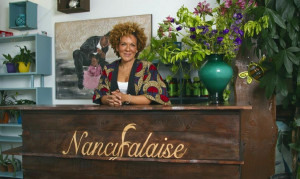The hair-extension industry did not help matters by pushing non-afro textured weaves to the forefront. Vivian Kaye, founder and CEO of KinkyCurlyYaki noticed this lack of representation when looking for a texture that resembled her own. What began as a search to solve her own problem turned into a multi-million dollar hair-extension business. Vivian has been featured on Shopify's Expert Academy Series, Ted Conference's "The Way We Work," in digital publications such as Black Enterprise, Ebony Magazine, Refinery21, Blavity, and on podcasts such as Shopify’s Vanguard, Side Hustle Pro, Hashtags & Stilettos, and She Did it Her Way.
KinkyCurlyYaki has since inspired many Black women to wear kinky curly hair weaves with confidence. I spoke with Vivian to learn more about the story behind the brand and her advice for other entrepreneurs.
How did the journey to success begin?
It started when I was running my first business. I had a wedding decor business called Vivian's Decor. I needed something that looked authentic on me. I needed something that looked 'quote unquote' presentable. When I went looking for kinky-textured hair, I found that it was buried underneath the Malaysian and Brazillian, you know all the silky textures. No one had kinky hair at the forefront. I saw that it was an issue and filed it in the back of my head. I was already running a successful business, and I was happy with it.
One day, I went to a Black girl meet-up, and a girl came up to me asking me who my hairdresser was and what my regime was. I had to be like, "Girl, this is a weave." And she was like, "Oh my goodness! I would buy that." I thought, “Wow!” and a light bulb went off. If she would buy it, and I bought it, that means there had to be at least a dozen other women who would buy it too. So in the down season of Vivian's Decor, my wedding business, I launched KinkyCurlyYaki in December 2012. It immediately took off.
Did you think it would ever be this successful?
No. I don't build businesses from the ground up, so I have no previous experience in running businesses. I literally was making stuff up as I was going along. I think it was actually to my benefit that I was naive about business. I was willing to try everything and do everything. I wasn't afraid to be the janitor in my own business. So, when I started my business, I did everything from web design to fulfilment to customer service. I did everything and it helped bring that success to my business. It was because it was part of my story. People loved the fact that I was a Black woman. In the hair-extension industry, even the beauty supply stores, they're all Korean. When you are buying online, sometimes, they’re Chinese. But, at the time, there weren't a lot of Black women who were selling hair extensions. So that certainly helped to build my business and make me as successful as I am.
Where did you get your products from?
I didn't set out to start a business. I set out to solve my own problem. This was before AliExpress was what it is now. I would just email a bunch of people, a bunch of vendors that I found in my research, asking them to help me create this specific texture. A lot of them had textures that were similar, but they weren't quite kinky enough. There was no demand for it. Once I actually settled on a factory, I had them tweak it. I said, “You gotta make it closer; you gotta make it kinkier and kinkier; make the curls tighter and tighter,” until I was happy with what they were producing. At the time, kinky textures were not a thing. If they had it, they buried it underneath all these other textures. It wasn't what it is today. I basically created the niche. Natural hair, as you know, has taken a while to come to the forefront. Back in 2012, people were still unsure, and they would rather stick to the more exotic textures. But with companies like mine, I've helped bring kinky texture to the forefront and made it okay for people to wear it as a protective style, or wear it and not tell anyone they are wearing a protective style.
What were some of the challenges you have faced?
One of the first challenges I encountered was people telling me that no one was going to buy kinky hair. At the time, everyone was buying the silky Malaysian, Brazilian, Indian, or whatever other texture that wasn't kinky. I remember when I first launched I had a lot of people say, "Oh, this business won't last because no one is going to buy kinky hair." Several million dollars later, you can see it's not a problem. The second problem was scaling. At the time, there was no one just selling kinky hair, so I scaled really quickly. As they say, more money more problems. I started the business in 2012, and I didn't hire the first employee until 2016. In between that, in 2014, I had a baby. I was a single mother at the time and it was a real challenge. Wanting a million-dollar business and caring for a newborn was pretty tough. I would have to say that those were my two challenges.
Did you ever want to give up?
Yes and no. The entrepreneur game is a rollercoaster ride. There are some good days. There are some bad days. And then there are days that I'm like, “I don't know.” I look to see if I should get a 9 to 5, but then I remember why I started the business, and I move forward. Especially now, with my coaching clients, they see that I'm not your typical success story. They see that I don't have a conventional background. I didn't start this business with any money. I would sell two bundles of hair, and I would take that money and buy four bundles of hair. I slowly built my business up to what it is today. Whereas, nowadays, when you are seeing people with a success story, it sounds like they built everything overnight. I am one of the few entrepreneurs who actually tells the truth and who actually has receipts. I have had the highs of six-figure months and five-star reviews to the lows of late inventory and irate customers. I have been there. I have done that. I have a lot of receipts to prove it. I have the experience to prove it.
What have you learnt along the way that you can give to others as advice?
One of the biggest things that I tell people is that they need to be solving a problem. A lot of people are starting businesses just because they wanted to start a business. They don't know why, and you need to know your why. Why are you even doing this business? I remember turning down a coaching client because she was like, "I have no sales, and I have been doing this since March." I was like, “Ok, well why are you doing this business?” She was like, "I don't know." I was like, “Well, that's why you have no sales. It is because you don't know why you are doing it.” Your ‘why’ comes across in everything you do.
If you have a ‘why,’ it leads to number two, which is solving a problem. You immediately create an audience for that. And this is because there are going to be other people who have that same problem. So, then why you created it was because you wanted to solve a problem. You have to have those two in place.
Thirdly, start small. None of this stuff happens overnight, and you should not be afraid to start small. Everyone thinks that they need to go big or go home. No. You just need to start small. Eventually, I would say create a niche product. Sometimes, I have people say, "Oh, you know what? I want to sell shoes." Ok? What type of shoes are you going to sell? Because everyone sells shoes. What makes your shoes unique? And so then my recommendation is to niche it. Niche your product and make it authentic because that's what is going to differentiate you from everyone else. Even if you are opening another hair-extension brand, a clothing boutique, or whatever it is that you want to open, just niche it and speak to a very specific group of people. That is the audience who will support your business and will make it successful.
How important is quality and proficiency in running a business?
They are absolutely important, but in terms of products, you sort of have to choose. Because it's either you're making a quality product, you're making it cheap, or you're doing it fast. You have to pick one. So, you can't say that you are providing a cheap thing and have premium quality because those two don't make sense. It also depends on what the product is. I have a pretty high price for my products. My average order is about a hundred and eighty-five dollars. What I pride myself on is that I provide a quality product. Now if you are going to be selling a quality product, and you're selling it cheap, then you are not really doing yourself a favour. It doesn't really jive with what you are selling. And then it probably doesn't make sense in your branding as well. It's really important that if you are going to pick either cheap, fast, or premium, you pick it and then make sure that theme moves across everything you touch in terms of your business.
How important is hard work in a successful business?
Hard work is super important. I think especially at the beginning. I put in a lot of hard work at the beginning so that now I can work smarter. Yes, of course, you can work smarter at the beginning; but sometimes you are giving up too much of your business to do that. I'm a big believer in being a janitor in your business. You can be everything from a janitor to the CEO; because once you start to delegate paths or outsource things from your business, and you have no idea what it's supposed to be doing, it is very easy for fraud to happen. So when you are first starting a business, it is important that you have your hands in everything. As your business grows and scales, you know that if you are going to let go of the social media portion of the business, you would have already known what your audience responds to. So once you give it up to someone, you can give them a document that has all your systems and processes in place. This way, they can help present your brand to the public as you would. But if you don't know anything about that, they could go and do a bunch of stuff, and you don't even know.
How important is it for Black people to be employers of labour as opposed to working for other people?
Black women, specifically, are the fastest-growing group of entrepreneurs right now. We are doing it because we are serving our own needs. A lot of the businesses that we are setting up are serving ourselves. So it's super important that when you are creating a business, make sure you are solving a problem.
It's important that you take the skills [you learned elsewhere]. So, if you learned customer service by working for big corporate companies, take those same skills and apply it to your business. That's one thing that's lacking. A lot of these Black businesses think, "Oh, well, I'm just serving my people. They don't care. I don't care, So, no one cares." Well, that's why a lot of businesses have high failure rates. So, what we need to do, and what we have been doing all our lives, is that we have to do better and then some. I think it's super important that if we are starting businesses, especially when we are serving ourselves, we should hold ourselves to a higher standard. It's unfortunate that I have to say that, but that's the way it is. We all know about those stores you go into that are Black-owned, and the customer service is lacking. We need to change that so that we can create generational wealth and businesses that can last.
And what a lot of people do is that they tend to keep a lot of the stuff to themselves and don't want outside help. They don't trust anybody. How are you supposed to build or scale a business if you are trying to keep everything close to your heart? Other groups don't do that. They share the wealth. They share the information. They hire their own. They do all that. All my customer service representatives and everyone on my team is Black except for my accountant. They understand the language I need to speak to my own people. I tell my customer service representatives to treat our customers with great service. It is super important--especially if we want to create wealth for our children's children--that we start now. We need to break those curses now.
What are five things you would have told yourself at the beginning stages?
- Trust yourself.
- You know more than you think you do.
- Take small steps. People tend to think all these big things need to happen in order for big things to happen, but it's the small things. It's not a sprint. It's a marathon.
- Take care of yourself. A lot of times when you are starting a business, you run yourself ragged. That could cause burn out. You need to stop and take care of yourself. Emails will always be answered. If you have children, make sure you spend as much time with your children as possible because this entrepreneur life is not easy.
- Keep a positive mind. It is so easy to get down in the dumps because your day didn't go the way you want or your order didn't get filled. Whatever the case may be, I found that the more I focus my mind on good, the more good comes to my life. I wish I could have reminded myself more of that earlier on.
And a bonus one is ‘What would Chad do?’ Chad is this mediocre white guy who's doing all the things he shouldn't be doing. He has no experience and doesn't have any business doing that. But he doesn't feel the need to be validated; he just does it because he believes in himself. As Black Canadian women, we need to think like Chad would. A lot of us are like, "I don't know. That might be too aggressive” Or “I don't know if I should ask." But why? Chad wouldn't ask. Chad just does it. So the next time you start thinking of questioning yourself, you need to have that same white man audacity and apply it to whatever you are doing in life. There is no reason why you shouldn't be where Chad is. There's no reason.
For more information on Vivian Kaye and KinkyCurlyYaki visit: VivianKaye.com
Lucy Oneka is a playwright and journalist. She has covered many stories for Toronto-based newspapers such as the East York Observer, the Scarborough Observer, and the Toronto Observer. Lucy’s other passion is music. She is a two-time semi-finalist of the prestigious UK Song Writing Contest and recently released her own debut gospel album, “You Are Faithful”.

 By Lucy Oneka
By Lucy Oneka 








